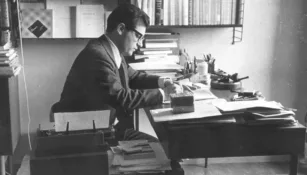ARTICOLI / 3 / Michael Losonsky /
Leibniz’s work on language left a lasting impression on 18th-century philosophical thinking about language. His two major works that discussed natural language were both published in the 18th century and in these works Leibniz focused on the sound symbolism, phonology, and etymology of language, topics that played a major role for 18th-century philosophers of language. These topics belonged to what Leibniz considered the material aspects of language and were tied to the expressive powers of language. Herder acknowledged Leibniz’s influence and developed these ideas in his account of language as a forceful expression of human feeling. However, Herder ignored the formal components of language. The philosopher who developed the synthesis of the material and the formal features of language was Wilhelm von Humboldt, who drew from 18th-century thinkers that saw natural language as a unity of force and form, for example Sulzer and Harris. Humboldt was especially influenced by his tutor, Johann Jakob Engel, whose lectures drew on Leibniz as well as works in the Leibniz-Wolff tradition.
Bibliography
Abbreviations of Leibniz Works:
- A = Sämtliche Schriften und Briefe, hrsg. von die Deutsche Akademie der Wissenschaften zu Berlin, Darmstadt and Berlin, Akademie Verlag 1923-
- L = Philosophical Papers and Letters, ed. and trans. by L. Loemker, Dordrecht, Kluwer 19702.
- GP = Die philosophischen Schriften von Gottfried Wilhelm Leibniz, hrsg. von C. I. Gerhardt, 7 Bde, Berlin, Weidmann 1875-1890.
- Aarsleff, H. 1982. From Locke to Saussure, Minneapolis, University of Minnesota Press.
- Aarsleff, H. 2007. The Context and Sense of Humboldt’s Statement that Language ‘ist kein Werk (Ergon) sondern eine Tätigkeit (Energeia)’, in E. Guimarães, D. L. P. de Barros, History of Linguistics 2002, Amsterdam-Philadelphia, John Benjamins Publishing Company, pp. 197-205.
- Arnold, G. 2005. „…der größte Mann den Deutschland in den neuern Zeiten gehabt“ ‒ Herders Verhältnis zu Leibniz, «Studia Leibnitiana», 37, pp. 161-185.
- Borsche, T. 1981. Sprachansichten: Der Begriff der menschlichen Rede in der Sprachphilosophie Wilhelm von Humboldts, Stuttgart, Klett.
- Bennett, J. 1996. Introduction, in G. W. Leibniz, New Essay on Human Understanding, trans. and ed. by P. Remnant, J. Bennett, Cambridge, Cambridge University Press.
- Cudworth, R. 1837. The True Intellectual System of the Universe, 2 voll., Andover, Gould and Newman.
- Cudworth, R. 1996. Treatise on Eternal and Immutable Morality with a Treatise of Freewill, ed. by S. Hutton, Cambridge, Cambridge University Press.
- Harris, J. 1841. The Works of James Harris, Oxford, Thomas Tegg.
- Herder, J. G. 1827. Fragmente zur Deutschen Literatur, ed. by C. G. Heyne, Stuttgart-Tubingen, Cottsche Buchhandlung.
- Herder. J. G. 1881-1892. Herders Sämmtliche Werke, ed. by B. Suphan, Berlin, Weidmann’sche Buchhandlung.
- Herder, J. G. 2002. Philosophical Writings, trans. and ed. by M. Forster, Cambridge, UK, Cambridge University Press.
- Humboldt, W. 1907. Wilhelm von Humboldts Gesammelte Schriften, ed. by A. Leitzmann, 15 Bde, Berlin, Behr Verlag.
- Humboldt, W. 1999. On Language: On the Diversity of Human Language Construction and its Influence on the Mental Development of the Human Species, intr. by M. Losonsky, trans. by P. Heath, Cambridge, Cambridge University Press.
- Hutton, S. 2017. Salving the Phenomena of Mind: Energy, Hegemonikon, and Sympathy in Cudworth, «British Journal for the History of Philosophy», 25(3), pp. 465-486.
- Leibniz, G. W. 1996. New Essays on Human Understanding, trans. and ed. by J. Bennett, P. Remnant, New York-Cambridge, Cambridge University Press.
- Losonsky, M. 2006. Linguistic Turns in Modern Philosophy, Cambridge, Cambridge University Press.
- Müller-Vollmer, K. 1976. Von der Poetik zur Linguistik – Wilhelm von Humboldt und der romantische Sprachbegriff, in Hammacher, K. (hrsg.), Universalismus und Wissenschaft im Werk und Wirken der Brüder Humboldt, Frankfurt am Main, Vittorio Klostermann, pp. 224-240.
- Müller-Vollmer, K. 1989. Thinking and Speaking: Herder, Humboldt and Saussurean Semiotics, «Comparative Criticism: An Annual Journal», 11, pp. 193-214.
- Pénnison, P. 2002. Trieb et énergie chez Herder, «Revue germanique internationale», 18, pp. 45-52.
- Reimarus, H. S. 17663. Die Vernunftlehre als eine Anweisung zum richtigen Gebrauche der Vernunft in dem Erkenntniss der Wahrheit, Hamburg, Johann Carl Bohn.
- Reimarus, H. S. 17724. Die vornehmsten Wahrheiten der natürlichen Religion, Hamburg, Johann Carl Bohn.
- Reimarus, H. S. 1982 [17601]. Allgemeine Betrachtungen über die Triebe der Thiere, hauptsachlich über ihre Kunsttriebe, Göttingen, Vandenhoeck & Ruprecht.
- Robins, R. H. 1990. Leibniz and Wilhelm von Humboldt and the History of Comparative Linguistics, in T. De Mauro, L. Formigari (eds.), Leibniz, Humboldt, and the Origins of Comparativism, Amsterdam-Philadelphia, John Benjamins Publishing Company, pp. 85-102.
- Sulzer, J. G. 17822. Johann Georg Sulzers vermischte Philosophische Schriften, vol. 1, Leipzig, Weidmanns Erben.
- Taylor, C. 2016. The Language Animal: The Full Shape of the Linguistic Capacity, Cambridge, MA, Harvard University Press.
- Trabant, J. 1990. Traditionen Humboldts, Frankfurt am Main, Suhrkamp.
- Wolff, C. 1963. Preliminary Discourse on Philosophy in General, Indianapolis, Bobbs-Merrill.

